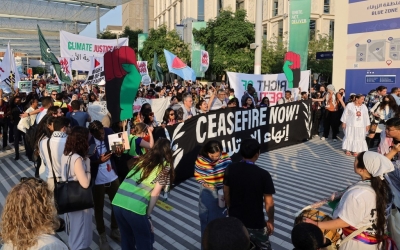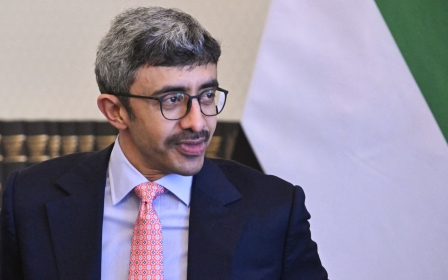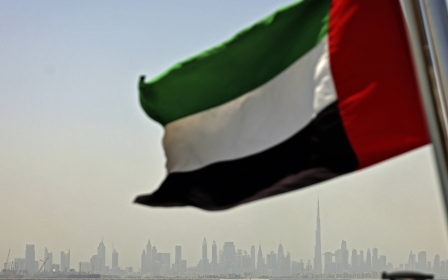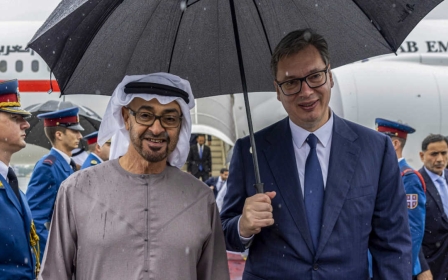UAE84: 43 defendants sentenced to life in second-largest trial in UAE history
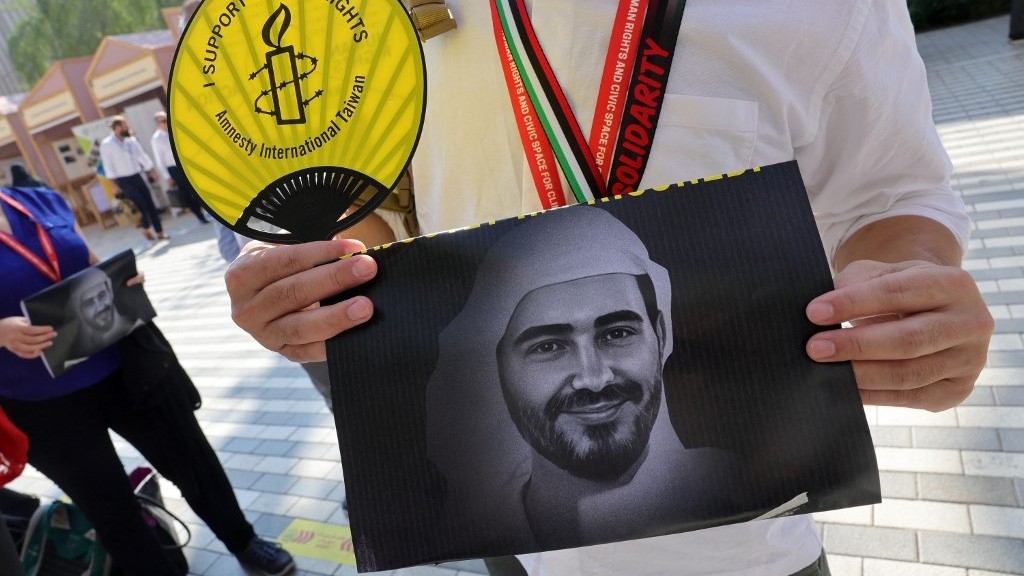
Forty-three Emiratis were sentenced to life in prison on Wednesday in the second-largest trial in UAE history, which UN experts and rights groups have widely criticised.
The Abu Dhabi Court of Appeal sentenced the men who were described by the state-run news agency WAM as leaders and members of the Muslim Brotherhood, an organisation the UAE has designated as a terrorist group.
However, rights defenders argue that the mass trial, which began during the UAE-hosted COP28 summit in Dubai, is politically motivated and marred by fair trial violations.
"This trial is a real parody of justice and illustrates how, under the guise of the fight against terrorism, critical voices are stifled," Alexis Thiry, legal advisor for Geneva-based MENA Rights Group, told Middle East Eye.
"We hope that these convictions will be overturned on appeal and we call for their release."
New MEE newsletter: Jerusalem Dispatch
Sign up to get the latest insights and analysis on Israel-Palestine, alongside Turkey Unpacked and other MEE newsletters
Most of the 84 defendants in the case, dubbed the "UAE84", were convicted a decade ago in the UAE's largest-ever mass trial and include some of the country's highest-profile political prisoners.
Held at the height of the Arab Spring, the trial, shorthanded as the "UAE94", saw 94 people who had petitioned leaders for democratic reforms accused of plotting to overthrow the government.
'This trial is a real parody of justice'
- Alexis Thiry, MENA Rights Group
Many of the defendants had completed their prison sentences but were still being held in controversial rehabilitation centres when they were given new charges last year.
Joey Shea, UAE researcher at Human Rights Watch, said the country had "dragged scores of its most dedicated human rights defenders and civil society members through a shamelessly unfair trial riddled with due process violations and torture allegations".
“These over-the-top long sentences make a mockery of justice and are another nail in the coffin for the UAE’s nascent civil society,” she said.
Lack of information
According to the Emirates Detainees Advocacy Centre (EDAC), Sultan bin Kayed Al Qasimi, a senior member of the ruling family in Ras Al-Khaimah, and academic and activist Mohammed Abdul Razzaq al-Siddiq, were among those who received life sentences.
Others sentenced included human rights defenders Abdulsalam Mohamed Darwish al-Marzooqi and Nasser Bin Ghaith, who is also an economist.
Five men received 15-year sentences, five received 10-year sentences, one man was acquitted and 24 others had their cases dismissed, WAM reported.
Authorities have yet to release full officials details about the convictions and sentences, leaving the verdicts of many of the defendants unknown.
Lack of official, public information has been characteristic of the trial.
Many families didn't realise their relatives were on trial again until after the initial hearing, said Ahmed al-Nuaimi, who was sentenced in absentia in the UAE94 trial.
Some of the defendants had been held incommunicado for between seven months and two years before the trial began, al-Nuaimi said.
"No one knew where they were. They could not even call their parents, their wives," he said, speaking at the Geneva Press Club in an event earlier this week.
"They could not be in contact with their lawyers."
Lawyers have said they believe the men were charged under the UAE's 2014 counterterrorism law, which has been criticised for enabling the conviction of peaceful government critics as terrorists.
They have also said it was problematic that the men appeared to be being retried for issues for which they had already been convicted.
"They were in jail in 2012," al-Nuaimi said. "This law came in 2014. How can you go back and charge them for that?"
Seven-minute hearing
On Wednesday, families watched their relatives' sentences being delivered via a television screen in a separate room in the courthouse, EDAC's executive director, Hamad al-Shamsi, told MEE.
During the swift hearing, the judge referred to some of the defendants present in the courtroom by their names, but some only by numbers, al-Shamsi said.
"The decision lasted only seven minutes," he said.
Jenan al-Marzooqi, whose father Abdulsalam was convicted in the earlier mass trial and sentenced to life imprisonment on Wednesday, said this trial "lacked the most basic elements of a fair trial, with violations more severe than what we witnessed during the first trial in 2013".
'To this day, the lawyer has not been given the case file'
- Jenan al-Marzooqi, daughter of Abdulasalam al-Marzooqi
"The entire trial was shrouded in strict secrecy. We did not learn about the charges or the names of the accused until after the court sessions began. To this day, the lawyer has not been given the case file."
Marzooqi said there was "clear confusion" during Wednesday's hearing, as many detainees' names and sentences were not mentioned.
"We are still waiting to get the official document with the verdict, which our attorney said he won’t have access to it until next week" she said.
Shamsi said human rights advocates had met repeatedly with foreign officials at embassies in the UAE, asking them to send representatives to the hearings.
"We really hoped the international community would have a bigger role or at least send observers, but this didn't happen," he said.
By law, the men have the right to appeal Wednesday's ruling, but both Shamsi and Marzooqi expressed doubts that the outcome would change - or even whether appeals would be pursued in the circumstances.
"My own assumption is that they will not appeal because, from the beginning, they knew this was a joke, a play, not something real," said Shamsi.
Middle East Eye delivers independent and unrivalled coverage and analysis of the Middle East, North Africa and beyond. To learn more about republishing this content and the associated fees, please fill out this form. More about MEE can be found here.


